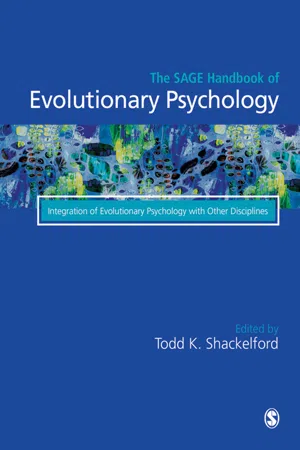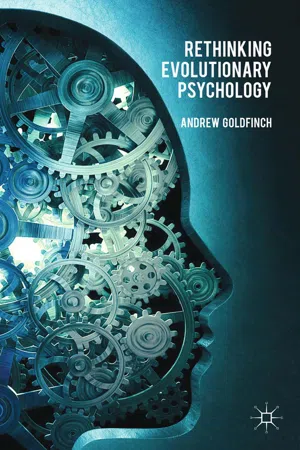Evolution and Behavior
Evolution and behavior refers to the study of how evolutionary processes have shaped human and animal behavior. It explores how behaviors have evolved over time to enhance survival and reproductive success. This field examines the influence of genetics, natural selection, and environmental factors on the development of various behaviors.
8 Key excerpts on "Evolution and Behavior"
- eBook - ePub
Neuroscience, Psychology, and Religion
Illusions, Delusions, and Realities about Human Nature
- Malcolm Jeeves, Warren, Jr. Brown(Authors)
- 2009(Publication Date)
- Templeton Press(Publisher)
...Accordingly, it presumes that natural selection favored genes that engendered our ancestor with behaviors and brain-processing systems that solved survival problems, thus contributing to the spread of their genes. In 1992, John Tooby and Leda Cosmides defined evolutionary psychology as “psychology informed by the fact that the inherited structure of the human mind is a product of evolutionary processes.” 2 Thus, the main focus of research in evolutionary psychology is the question of how humans came to be the special animal that we seem to be. According to evolutionary psychologist Richard Byrne, some of the central questions in this field are: When did a particular cognitive trait enter the human lineage? What was the trait’s original adaptive function? Has it been retained for the same reason, or is it now valuable for some different purpose? Furthermore, what is the cognitive basis for the behavioral trait, and how does its organization relate to other mental capacities? 3 In discussions of comparative and evolutionary psychology, anthropomorphism figures large. As a result, popular reporting easily gives the impression that it is unproblematic to interpret the behavior of animals closest to us on the evolutionary scale based on our human experience. Frans de Waal comments: This use of anthropomorphism as a means to get at the truth, rather than an end in itself, sets its use in science apart from use by the lay person…. The ultimate goal of the scientist is emphatically not to arrive at the most satisfactory projection of human feelings onto the animal, but rather at testable ideas and replicable observations...
- eBook - ePub
The SAGE Handbook of Evolutionary Psychology
Integration of Evolutionary Psychology with Other Disciplines
- Todd K. Shackelford(Author)
- 2020(Publication Date)
- SAGE Publications Ltd(Publisher)
...12 Evolutionary Psychology and Anthropology Elizabeth Cashdan, Joan B. Silk, and Aiyana K. Willard Introduction An interest in human evolution has a long history in anthropology, but it was not until the 1970s that an explicitly Darwinian view of human behavior galvanized scholars simultaneously in anthropology, biology, and psychology. The fields of evolutionary psychology and evolutionary anthropology share a theoretical foundation in natural and sexual selection, and both reject what Tooby and Cosmides (1992) have called the ‘standard social science model’ of human nature as a blank slate unconstrained by biology. Yet the early years were also fractured by disputes between the fields. Evolutionary psychologists faulted evolutionary anthropologists (especially human behavioral ecologists) for their assumption that behavior will be fitness-enhancing, arguing that adaptations to the ‘environment of evolutionary adaptedness’ (EEA) could be best understood by focusing on the evolved mental modules themselves (Symons, 1992). Evolutionary anthropologists, in turn, faulted evolutionary psychologists for giving insufficient attention to the trade-offs between different goals required to respond adaptively in different environments (Smith et al., 2001). These differences are waning as evolutionary psychologists expand their attention to environmental sources of variation and as evolutionary anthropologists consider the psychological mechanisms that mediate environmental influences on behavior. Anthropology is defined by its temporal and cross-cultural breadth, both of which shed light on the contexts in which our psychological adaptations evolved. We begin by considering humans in a phylogenetic context, in order to understand the evolutionary antecedents of our cognitive abilities, prosociality, and psychological adaptations for social learning...
- eBook - ePub
- Hugh Wagner, Kevin Silber(Authors)
- 2004(Publication Date)
- Taylor & Francis(Publisher)
...This produces genetic diversity in the offspring. Genes on the same chromosome are not always inherited together. The genetic makeup of each individual organism is its genotype. The extent to which a gene exerts its effect depends on environmental influences, resulting in the phenotype. In discussing the old ‘nature–nurture problem’ people often took either/or positions on the roles of genetic and environmental factors. Genes do not directly determine behaviors, but affect biochemical processes involved in behavior. Related topic Methods of research (A2) The biological context of psychology Psychology is the study of behavior and mental processes. Our chief concern is with human psychology. In at least two ways, psychology is a biological science: • humans are products of evolution. This continuity with other species means that we can make meaningful comparisons with the behavior of other species. For example, principles of learning have been studied in experiments on rats. It also means that psychology has to consider how evolution has shaped human behavior; • mental processes and behavior are dependent on the nervous system (see Sections C and D) and the endocrine system (see Section E). Biological psychology (or psychobiology) includes all approaches to psychology that place it in its biological context, examining the biological bases of behavior. One such approach is the examination of the evolution of human behavior, in a field known as evolutionary psychology. This discipline tries to extend to human behavior principles from studies of other species. When this approach is applied to social behavior the field is called sociobiology. Sociobiology applies principles of evolution, predominately Darwinian, to the study of social behavior. A key concept is the selfish gene (Dawkins, 1989)...
- eBook - ePub
The Cognitive Sciences
An Interdisciplinary Approach
- Carolyn P. Sobel, Paul Li(Authors)
- 2013(Publication Date)
- SAGE Publications, Inc(Publisher)
...The question is not “What are we and how do we work?” but rather “How did we become as we are?” The name that has been given to this project is evolutionary psychology—but be aware from the start that the name does not imply simply a subset of the field of psychology. The research conducted within it is concerned with the evolutionary approach to understanding human behavior and the human mind. Before proceeding with a brief necessary background discussion of the theory of evolution, let us take note of the guiding principles of evolutionary psychology, as summarized by two leading proponents of the field: Principle 1. The brain is a physical system. It functions as a computer. Its circuits are designed to generate behavior that is appropriate to your environmental circumstances. Principle 2. Our neural circuits were designed by natural selection to solve problems that our ancestors faced during our species’ evolutionary history. Principle 3. Consciousness is just the tip of the iceberg; most of what goes on in your mind is hidden from you. As a result, your conscious experience can mislead you into thinking that our circuitry is simpler than it really is. Most problems that you experience as easy to solve are very difficult to solve—they require very complicated neural circuitry. Principle 4. Different neural circuits are specialized for solving different adaptive problems. Principle 5. Our modern skulls house a Stone Age mind. (Cosmides & Tooby, 1997) We will be referring to some of these principles as we arrive at areas of controversy. For now, let us proceed to the necessary framework for what follows. EVOLUTIONARY THEORY To understand the task evolutionary psychology has set for itself, it is necessary to have at least a basic understanding of the theory of evolution. It would not be possible, or appropriate, to present in this text a complete history or explanation of this theory...
- eBook - ePub
- Mark Schaller, Jeffry A. Simpson, Douglas T. Kenrick, Mark Schaller, Jeffry A. Simpson, Douglas T. Kenrick(Authors)
- 2013(Publication Date)
- Psychology Press(Publisher)
...More and more social psychologists are drawing on an evolutionary perspective to inform their research—with salutary effects on our collective understanding of social cognition and behavior. EVOLUTIONARY SOCIAL PSYCHOLOGY IS EVERYWHERE Once upon a time, social cognition represented a relatively small and austere little niche in the study of social behavior. Today, it hardly makes sense to treat social cognition as a specialized domain of inquiry or to separate the study of social cognition from the study of social psychology more broadly. No longer is cognition relevant merely to, say, the study of person perception and impression formation; it is fundamental to our understanding of aggression, altruism, close relationships, intergroup prejudice, social influence, and every other form of interpersonal or group behavior discussed in any introductory social psychology textbook. The same trajectory now characterizes the evolutionary perspective on social psychology. Although an evolutionary perspective had been lurking on the fringes of certain social psychological topics for several decades—during which time biological scientists of all kinds were embracing evolutionary analyses to elucidate the behavior of animal species (see Alcock, 2001)—the power of evolutionary models was not at first widely recognized by scientists who studied human beings. Early explorations in evolutionary social psychology focused on a few specific domains of behavior—especially altruism, aggression, and interpersonal attraction—for which the implications of evolutionary principles were most immediate and obvious (e.g., Buss, 1989; Daly & Wilson, 1988; Sadalla, Kenrick, & Vershure, 1987). Until quite recently, though, social psychologists working on most other topics found the evolutionary perspective easy to ignore. Well, things have changed...
- eBook - ePub
- A. Goldfinch(Author)
- 2015(Publication Date)
- Palgrave Macmillan(Publisher)
...1 Evolutionary Psychology as a Paradigm 1.0 Introduction We have evolved by natural selection. Even if not everything about an organism is an adaptation for survival and reproduction, it seems inescapable that organisms are well adapted, at least to the environment in which they evolved. Most consent to that proposition. But there is disagreement, often quite animated disagreement, as to what implications this has for psychology. Our ancestors faced a multitude of recurrent survival and reproduction problems. In order to survive and reproduce, one must locate and secure resources; avoid pathogens; avoid predators; find a mate; counter threats from mate poachers; form and maintain coalitions and relationships; establish and protect one’s status in a societal hierarchy; and so on. These problems are known as ‘adaptive problems’ and solutions to these problems promote reproductive success. One proposal, perhaps the dominant view, is that selection favoured one or a few general-purpose psychological mechanisms, general learning and decision-making mechanisms sufficient to generate multiple behavioural solutions to multiple adaptive problems. If this is the case, applying evolutionary perspectives to psychology might have limited mileage. An alternative proposal is that some or many of the problems were solved by dedicated psychological adaptations. Just as we inherit physiological specialisations, so too we might inherit psychological specialisations. If this is the case, this opens up the possibility that evolutionary theory can open up new lines of research in psychology. This is the possibility evolutionary psychologists pursue. Quite reasonable, isn’t it? If selection pressures have favoured physiological adaptations, then they might also favour psychological adaptations, and that this perspective might be useful in understanding psychology in some way. In a way, pursuit of this line of thought is ‘inevitable’ (de Waal, 2001)...
- eBook - ePub
- Charles Krebs(Author)
- 2008(Publication Date)
- CSIRO PUBLISHING(Publisher)
...‘Why’ questions concern the current function and evolution of behaviors. To appreciate the ecological approach to studying behavior, we need to understand how evolution shapes the behaviors and other traits of species. Adaptation Through Natural Selection Evolution is the change in the characteristics of species over time. Many characteristics of organisms are clearly not random, but are well suited to the organisms’ particular lifestyles. The process that generates the fit between the characteristics of organisms and their environment is natural selection. Two English naturalists, Charles Darwin (1809–1882) and Alfred Russel Wallace (1823–1913), independently and almost simultaneously proposed the theory that evolution occurs through natural selection. Because Darwin supported this theory with much more evidence, he is generally given most of the credit for its development. Darwin formulated many of his ideas on natural selection while traveling around the world as the ship’s botanist aboard HMS Beagle (Figure 4.2). During his travels, he was impressed by the enormous diversity of animals and plants and by their close relationships on a local scale. In his book The Origin of Species (1859), Darwin observed: ‘Nevertheless the naturalist, in travelling, for instance, from north to south, never fails to be struck by the manner in which successive groups of beings, specifically distinct, though nearly related, replace each other.’ These patterns in the diversity and distribution of species led Darwin to argue that new species evolved over time from a common ancestor by a process of descent with modification. Natural selection is the evolutionary link between organisms and their environment. It is critical for all ecologists to understand how it operates. We cannot predict how organisms will respond to changes in their environment without knowing something of the factors that helped shape the traits of those organisms...
- eBook - ePub
Evolutionary Psychology
The New Science of the Mind
- David M. Buss(Author)
- 2019(Publication Date)
- Routledge(Publisher)
...To reproduce, organisms must survive—at least for a while. Charles Darwin summed it up best: “as more individuals are produced than can possibly survive, there must in every case be a struggle for existence, either one individual with another of the same species, or with the individuals of distinct species, or with the physical conditions of life” (1859, p. 53). So an examination of the adaptive problems of survival is a logical starting point for human evolutionary psychology. Living poses a number of challenges. Although our current style of living protects us a great deal, everyone has at some point encountered dangers to their survival. Darwin called these the “hostile forces of nature.” They include extremes of climate, harsh weather, food shortages, toxins, diseases, parasites, predators, and hostile conspecifics (members of the same species). Each of these hostile forces has created adaptive problems for humans—challenges that have recurred in each generation over the long expanse of evolutionary history. The adaptive problems selected for successful survival solutions. They imposed a filter through which those who succumbed to disease, parasites, predators, harsh winters, and long dry summers failed to pass. As Darwin noted, “in the great battle of life… the structure of every organic being is related, in the most essential yet often hidden manner, to that of all the other organic beings, with which it comes into competition for food and residence, or from which it has to escape, or on which it preys” (1859, p. 61). Humans have always had to interact with the biological world in highly specialized ways. We have to know what we can eat, what might poison us, what we can capture, and what can capture us. Scientific research has indeed shown that humans universally appear to have a fairly sophisticated “folk biology” (Atran, 1998; Barrett, 2005; Berlin, 1992; Keil, 1995)...







